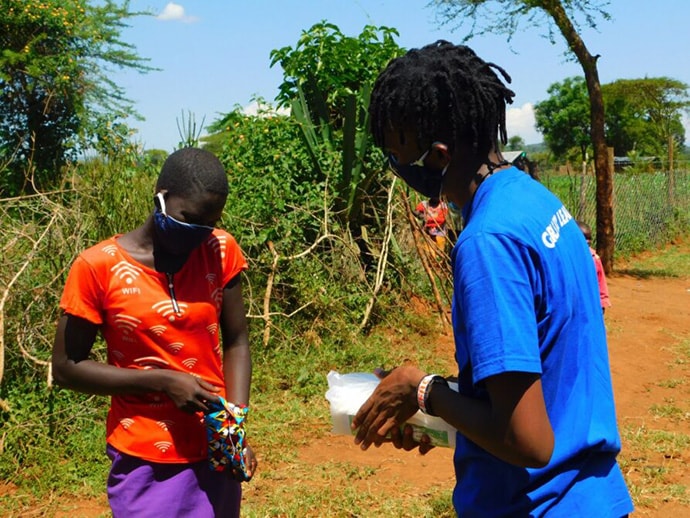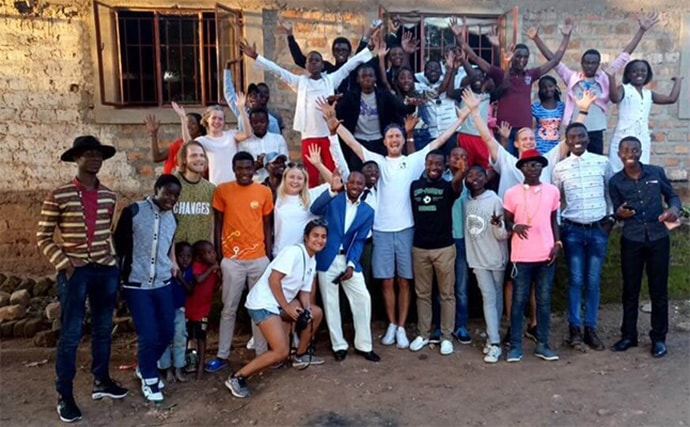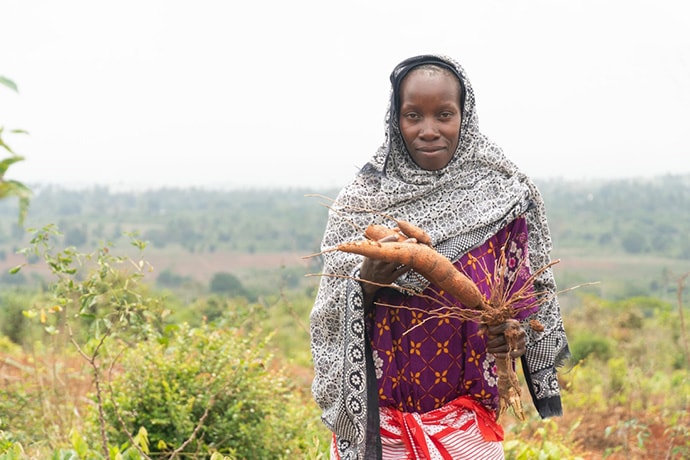Welcome to the October 2021 issue of the Global Washington newsletter.
IN THIS ISSUE
Letter from our Executive Director
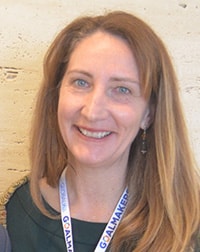
There are certain things that unite people across the globe and food is one of them. Food can provide a deeper understanding of a person’s culture, it can strengthen relationships, and it can provide livelihoods. It is also a basic human right that not everyone has. 2.37 billion people are without food or unable to eat a healthy diet on a regular basis.
The challenges of food distribution and agriculture are complex, but not insurmountable. As we celebrate UN World Food Day this month, I am amazed at the work of Global Washington members who are making progress to eradicate hunger, even amidst a global pandemic. And, how their work has evolved and adapted to current realities. Read more in the articles below.
Current trends and the future of global development practices is also the theme of the virtual 2021 Goalmaker Conference on December 8 and 9. Speakers will challenge and inspire participants to improve the field of global development and create more equitable systems. The conference will be virtual on an interactive platform which includes: 1 to 1 speed networking, discussion boards, mini-workshops, and a virtual exhibit hall. I hope you can join us. Register here.

Kristen Dailey
Executive Director
Back to Top
Issue Brief
Food Security and Food Systems are Fractured, Yet with Lessons From Local and Indigenous Farmers We can Perhaps Achieve 2030 Goals
By Joanne Lu
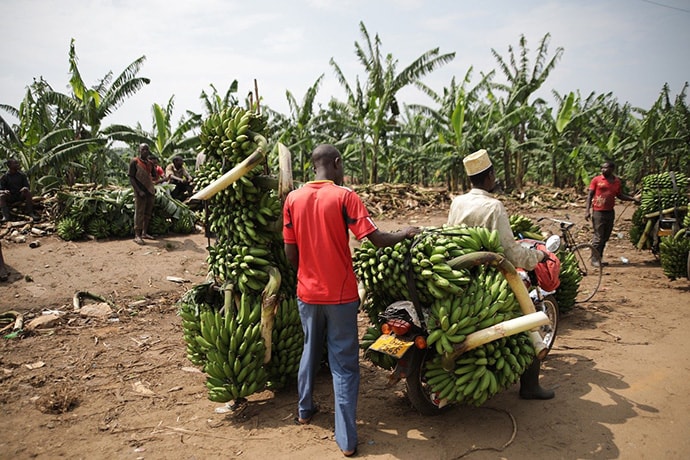
Banana farmers in Uganda.
We’re now less than 10 years away from 2030, the year by which the international community hoped to eradicate global hunger. It was always a tall order, and climate change plus the pandemic have made it even more challenging. The international community is being forced to consider how global food systems must be transformed.
Since 2014, the year before the international community adopted the Sustainable Development Goals (SDGs), the number of undernourished people in the world has actually increased, from 607 million to 650 million in 2019, according to the UN. Then, the pandemic happened, and it’s estimated that 70 million to 161 million more people experienced hunger in 2020. This equates to as many as 811 million people who are hungry and nearly 40 percent of the world population (or more than 3 billion people) who cannot afford a healthy diet.
Global awareness of the problem and urgency to solve it is increasing—although, some might argue, not fast enough. This month, the UN once again celebrated World Food Day, with a focus on promoting sustainable agri-food systems, defined as food systems in which affordable, nutritious food is available to everyone, less food is wasted, the supply chain is resilient against shocks, and production does not exacerbate climate change or harm the environment. Not only is this critical to achieving a UN goal of nourishing 10 billion people by 2050, but it is also critical to addressing profound inequalities and severe environmental degradation caused by the way we currently produce, consume, and waste food. Additionally, agri-food systems make up the largest global economic sector, employing 1 billion people around the world.
This global event follows closely on the heels of the first ever Food Systems Summit in September, held on the sidelines of the UN General Assembly. There, the UN secretary-general, UN agencies, governments, business leaders, farmers, and Indigenous people made the case for food systems reform with only “nine harvests left” until the SDGs deadline of 2030. The U.S. announced $10 billion in funding to “end hunger and invest in the food system,” half of which would be spent in the U.S., while the other half would be invested in “fighting global food insecurity.”
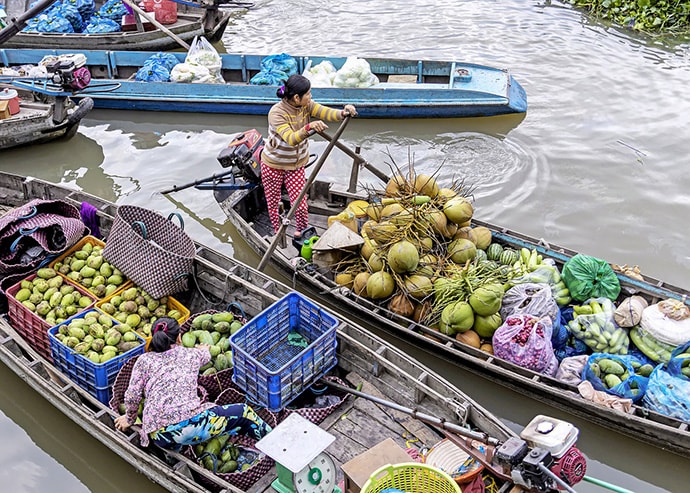
Food transportation and sale in Vietnam.
At the summit, the Bill and Melinda Gates Foundation made a commitment of $922 million over the next five years to address global nutrition, particularly for women and children. The commitment will support evidence-based, data-driven nutritious food systems, as well as fortifying staple foods with vitamins and minerals; maternal, infant, and young child nutrition; and innovative new approaches and interventions. It is the foundation’s largest nutrition commitment to date.
Yet, many groups criticized the summit, saying it gave corporations too much say and “promote[d] industrial monocultures over agro-ecological food.” Instead, some of the critics chose to host their own alternative summit, called the Global People’s Summit, alongside the official UN one.
“We believe that an equitable food system can only be built on the people’s right to land and livelihoods, and to decent working and living conditions for all,” the organizers of the People’s Summit said in a declaration published after the event. “This means that food production must be decided by the sovereign will of the people, based on their particular circumstances, priorities, and needs. Profit motives of corporations — euphemistically called market forces — should not determine what food to produce, how to produce it, and for whom.”
Regardless of the controversy, Indigenous people have been a key part of the discussion about sustainable food systems because their regenerative practices have sustained their communities and the earth for tens of thousands of years. Even now, Indigenous people protect 80 percent of the planet’s biodiversity. Their ability to continue doing so is critical to the entire world’s survival, including global food production. This is something that Nia Tero recognizes, which is why they work to “ensure that Indigenous peoples have the economic power and cultural independence to steward, support, and protect their livelihoods and territories they call home.” They do so through storytelling, policy advocacy, and initiatives that range from building solar-powered infrastructure to promoting Indigenous creatives.
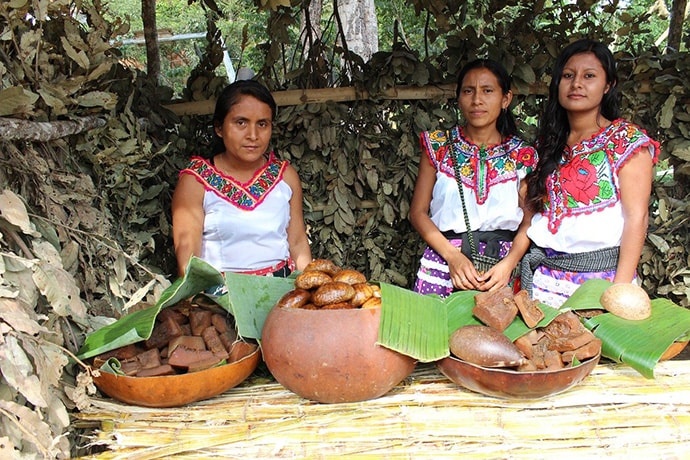
Indigenous Oaxacan women selling food at market.
Heifer International also advocates for sustainable, context-appropriate, decentralized food systems because locally based systems are more resilient against major shocks. Heifer works with smallholder farmers around the world to implement regenerative agricultural practices that produce more food, result in less waste, and reduce their carbon footprint. For example, no-till farming techniques can help reduce greenhouse gas emissions by not releasing carbon dioxide through traditional tilling.
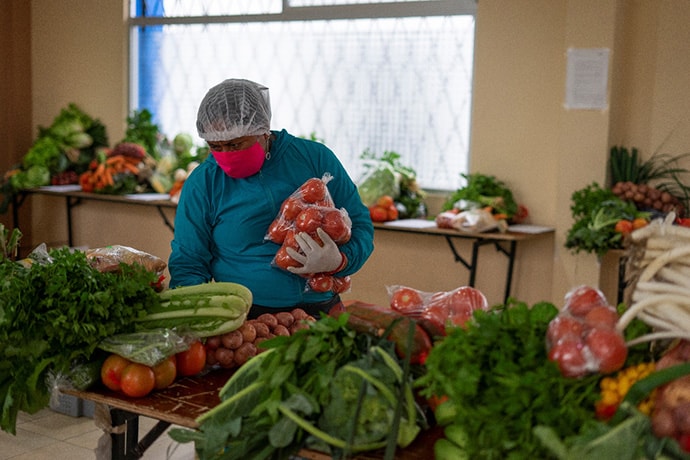
Local farmers supported by Heifer Ecuador built a farm-to-table food delivery system when the pandemic hit, delivering healthy food to households across the country. Credit: Isadora Romero/Heifer International
Many others have also recognized the importance of working with farmers – particularly smallholder farmers – to implement innovative techniques toward sustainable food systems. This month, Dr. Shakuntala Haraksingh Thilsted, native of Trinidad and Tobago and a Danish citizen, will be awarded the 2021 World Food Prize for her research and development of more productive and sustainable aquaculture practices for smallholder farmers. These new systems were nutrition-sensitive and transformed entire aquatic food systems. Her work, the World Food Prize Foundation says, has improved the diets of millions of the most vulnerable people in Asia and Africa.
The challenge set before us to achieve zero hunger by 2030 is ambitious, and made even more difficult by the pandemic. Yet, it appears there is growing urgency to reform our fractured global food system. Through investment, innovation, and collaboration with those who have sustained our planet for centuries, perhaps we can get several steps closer to that goal.
The following Global Washington members are helping with food systems and food security in low and middle income countries.
Earthworm Foundation
Earthworm Foundation is a global non-profit organization that works to make value chains an engine of prosperity for communities and ecosystems. Active in key agriculture commodity producing regions around the world, Earthworm collaborates with diverse stakeholders, including companies, communities and workers to ensure that commodity sourcing and production does not negatively impact community rights and livelihoods, environmental values, or workers. Our efforts to protect and enhance food security include initiatives focused on farmer livelihoods, healthy soils, capacity building in companies, and responsible plantation development. Our Rurality program promotes better smallholder farming practices and crop diversification with the goals of ensuring that farmer households have resilient livelihoods and access to a variety of food crops for their own consumption. At the corporate boardroom-level, we engage with company leaders to establish values-driven responsible sourcing policies, map their supply chains, and support farmers on issues such as food security for their regions.
Forest Stewardship Council
FSC Investments & Partnerships ensures forests help bring food to the table.
As part of the global Forest Stewardship Council (FSC) family, FSC Investments & Partnerships helps to promote the responsible management of the world’s forests. Forests play an important role in complementing the production of food from other sectors to help eliminate global hunger. For example, forests and trees can be managed to provide better and more nutritionally balanced diets and greater control over food inputs. This is particularly important for marginalized groups and during periods of vulnerability such as lean seasons.
Millions of households in the developing world depend on food and fodder from forests to supplement their diets and those of their livestock. Besides the direct supply of food, forests often provide important ecosystem services, which support the water cycle and help sustain healthy agricultural sectors. Deforestation and degradation can negatively impact on this, whereas responsible forest management as set out by the requirements of FSC, plays a key role in mitigating global hunger.
You can read more about how FSC Investments & Partnerships contributes to SDG 2 here.
Future of Fish
Fish as Food: The precarious nature of wild fish stocks has major implications for the world’s ability to achieve SDG2-Zero Hunger, focused on nutrition and global food security. Prior to the COVID-19 pandemic, an estimated 1 in 10 people faced malnutrition due to declining fish catches. The FAO’s 2021 Report on the State of Food Security and Nutrition estimates that the prevalence of undernourishment worldwide climbed to 9.9 percent in 2020, after virtually holding steady at 8.4 percent for the last 5 years. Globally, more than 3 billion people rely on fish as their primary source of protein. In many of the world’s least developed countries, where fish is often the cheapest source of protein, it accounts for more than 50 percent of protein consumption. Besides seafood being an optimal food choice for maintaining a nutritious diet, researchers have recently been investigating the antiviral properties of fish protein as part of the ongoing fight against COVID-19. For these reasons, catalyzing sustainable fisheries is as much an effort to address food security and human health as it is about environmental protection. This is why Future of Fish believes that the future of fish is not about fish, it’s about people. It’s about protecting the oceans that provide a vital source of food and livelihoods, for years to come. Future of Fish works to transform at-risk communities into thriving centers of coastal sustainability that can serve as replicable models for a just and blue economy. Knowing that one organization cannot shift the system alone, FoF partners with organizations addressing some of the ocean’s toughest challenges to protect a critical source of protein for billions of people.
Heifer International
Heifer International works with farmers to improve productivity, diversify their businesses and increase incomes. With a living income they can provide quality food for themselves and their families. Heifer International advocates for sustainable, context-appropriate, decentralized food systems because locally based systems are more resilient against major shocks. They work with smallholder farmers around the world to implement regenerative agricultural practices that produce more food, result in less waste and reduce their carbon footprint. For example, no-till farming techniques can help reduce greenhouse gas emissions by not releasing carbon dioxide through traditional tilling.
Landesa
Landesa champions and works to secure land rights for millions of those living in poverty worldwide, primarily rural women and men, to promote social justice and provide opportunity. Many of these women and men rely on their harvests to survive, and face the increasing pressures of land degradation, droughts, and crop pests that threaten their ability to produce adequate food. With strong rights to the land on which they depend, farmers find incentive to invest in long-term sustainable conservation measures that ultimately help yield sufficient nutritious food for their families.
In Laos, with support from the Food and Agriculture Organization of the United Nations, and working with local civil society groups, Landesa is strengthening national and local application of globally endorsed approaches, instruments, and knowledge around food security and nutrition, poverty eradication, and sustainable agriculture to accelerate progress towards Sustainable Development Goal 2, Zero Hunger. This work focuses on building government and other stakeholder capacity in addition to enhancing governance and accountability mechanisms in these areas. Landesa also acts as Secretariat to Stand For Her Land, a campaign aimed at empowering women with land rights to drive lasting change. Studies show that strengthening women’s land rights results in deep benefits, including improved household nutrition. Women comprise a large share of the agricultural work force in many regions and produce a significant portion of the world’s food.
Oxfam America
Oxfam is a global organization that fights inequality to end poverty and injustice. We offer lifesaving support in times of crisis and advocate for economic justice, gender equality, and climate action. We demand equal rights and equal treatment so that everyone can thrive, not just survive. The future is equal.
Urban Food Hives: Covid-19 exposed the fragilities and inequities of global food systems. Food insecurity, poverty, and hunger are no longer only rural phenomena, as broken supply chains and restrictions in movements affected families living in urban and peri-urban areas. Our challenge is to build a future food system that is capable of nourishing people in an era of increased risks; from climate shocks to conflict to growing inequality. Oxfam, in partnership with SecondMuse, is working with partners across six countries in Africa, Asia and Latin America – India, Nigeria, Uganda, Kenya, Colombia and the Philippines – to design, develop and implement the creation of Urban Food Hives to support regenerative, nourishing, equitable, and localized food systems. These Urban Food Hives will address inequality and advance climate and gender justice, recentering the food system to provide nutritious foods and give more voice and power to women, girls, and other marginalized communities.
To learn more about the Urban Food Hives Initiative, please contact Dr. Laté Lawson-Lartego at Late.Lawson@Oxfam.org
World Concern
World Concern has a strong emphasis on improving nutrition and food security in nearly every program area. Having enough to eat moves families beyond the struggle to survive and allows them to focus on the future for their children. Providing food for today and offering sustainable ways for families to produce nutritious food long-term opens the way for transformation.
We help families feed themselves and their communities in both emergency and community development contexts. We do this through nutrition training and breastfeeding education and support for mothers, nutrition supplements for children under 5, agricultural training and improved farming methods and tools, farmer groups, livestock distributions and training, vegetable gardening, and providing fishing equipment and training. To ensure the families have food throughout the year in drought-prone areas, World Concern trains them to cultivate drought-resistant crops, and to harvest and store rainwater to irrigate their farms during the dry season.
Back to Top
Organization Profile
In Many Ways, Heifer’s Principle of “passing on the Gift” Has Taken on New Forms, Just Like Their Work
By Joanne Lu

Local farmers supported by Heifer Ecuador built a farm-to-table food delivery system when the pandemic hit, delivering healthy food to households across the country. Credit: Isadora Romero/Heifer International
Heifer International has been on a 77-year journey to end hunger and poverty, not just in response to the greatest challenges of the times, but also with the goal of empowering families to create sustainable change for themselves.
Their story began in 1944, when Midwest farmer Dan West returned from volunteer service in the Spanish Civil War, where he helped feed refugees. But as a farmer, he became keenly aware that providing meals was a short-term solution. Instead, livestock could provide families a steady supply of nutritious food and even income.
Thus, Heifer International was born, and in the wake of World War II, groups of farmers began to accompany cows to devastated communities in Europe. They called themselves the “Seagoing Cowboys,” making about 360 trips on 73 ships, and also trained farmers on how to properly care for the cows to ensure optimal dairy production and breeding.
Over the decades, the geographic footprint of Heifer expanded across the globe to 21 countries, as did the variety of animals – chickens, goats, sheep, and alpaca – the organization placed with families, depending on what made the most sense in their contexts. And, according to one of the organization’s founding principles, the first offspring of an animal was always passed onto another family to spread the wealth – a practice that continues to this day.
Local farmers supported by Heifer Ecuador built a farm-to-table food delivery system when the pandemic hit, delivering healthy food to households across the country. Credit: Isadora Romero/Heifer International
Helping families achieve self-sustainable pathways out of hunger and poverty remains a central focus of Heifer. And they still do animal placement. But just over a decade ago, Heifer decided to make its goal even more ambitious: to help families reach a sustainable living income, in which all members of the household can afford a dignified standard of living, with nutritious food, safe shelter, clothing, health care, and quality education. This is a significantly higher standard than the World Bank’s extreme poverty line of $1.90 a day.
To help families reach sustainable living incomes, Heifer transitioned from hundreds of small projects in many countries around the world to investing in bigger projects that help farmers become part of a larger value chain and reach their goals. For example, in East Africa, Heifer has not only trained 230,000 dairy farmers on how to improve the health and yields of their cows, but they have also helped set up a network of milk hubs, managed by farmer cooperatives. Farmers deliver milk daily to these hubs, where the milk is tested, chilled, then stored in bulk units before being sold directly to one of the biggest milk distributors in the region.
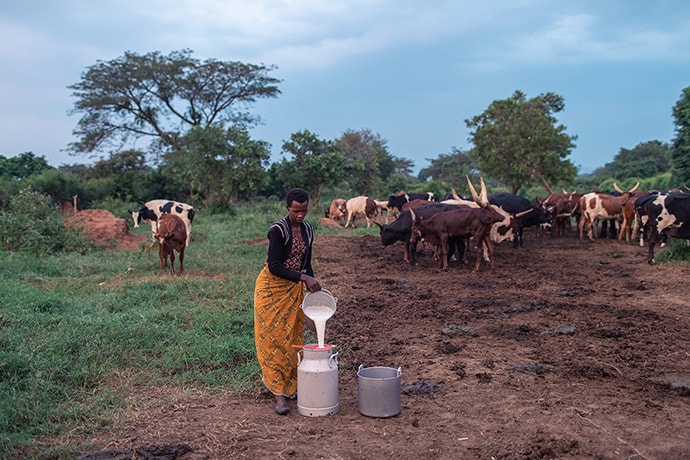
Heifer International has a long history working with dairy cooperatives across East Africa, supporting farmers to improve production and sell in bulk to new markets. Credit: Fabio Erdos/Heifer International
Not only does this hub system allow farmers to negotiate higher prices for a guaranteed bulk supply of milk that’s quality-tested, but farmers can also borrow money against the milk they’ve already delivered if they need cash sooner than the 30 days that it typically takes to get paid. Additionally, the hubs provide products that keep the cows healthy, as well as access to local veterinarians, and they can help farmers get loans from local banks and credit agencies if they want to invest in their farms.
But the benefits of the milk hubs extend to the wider community as well. Many community members have started businesses providing transportation options to farmers who need to get their milk to the hubs daily or purchasing milk to make other products like yogurt and cheese. In many ways, Heifer’s principle of “Passing on the Gift” has taken on new forms, just like their work.
Today, Heifer’s projects range from dairy production and spice farming, to egg production, with economic development, technical assistance, and women’s empowerment key focus areas. But across all their work, farmers remain at the center. That’s because Heifer believes in farmers. Farmers, they say, are the guardians of the planet. They work the soil, produce the food that is on our tables, and drive rural development. As such, Heifer also believes that smallholder farmers have a big role to play in solving the climate crisis. Through regenerative agricultural practices, which Heifer promotes through training and support, farmers can help the world reduce emissions and get carbon back into soil. Supporting decentralized local food systems can also make us all more resilient against big shocks.
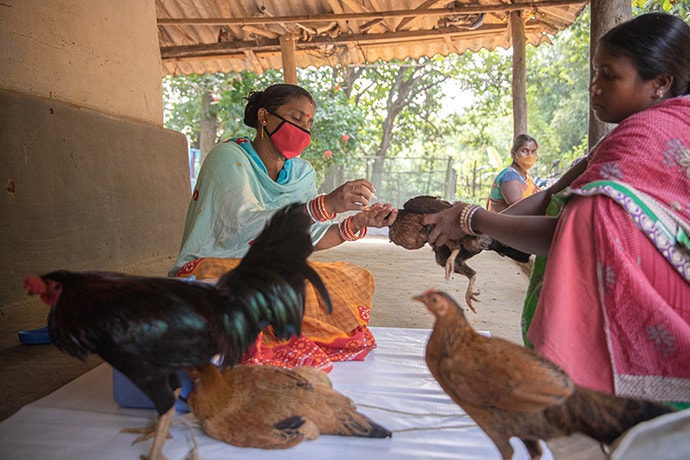
Heifer-trained community agri-vet entrepreneurs provide important services to farmers, keeping their animals healthy. Credit: Pranab K. Aich/Heifer International
Furthermore, the world is still reeling from the most recent shock of COVID-19. For the farmers that Heifer supports, their access to markets and transportation were immediately hit by government-mandated lockdowns, while other community members struggled to get access to fresh food. Heifer responded by investing in “agri-ambulances,” refrigerated trucks that delivered milk, crops, and even meat to consumers and hubs. Cooperatives also supported farmers through savings and loans functions, while Heifer also deployed funds to meet some of their farmers’ immediate needs.
Despite the challenges of the past year and a half, and the increasing challenges of climate change, Heifer is excited about the trajectory they’re on. So far they’ve helped more than 34 million families out of poverty. By listening to farmers, identifying the best intervention points in value chains, and investing in the infrastructure that farmers need to thrive, Heifer believes they can reach their next goal: supporting 10 million more families to reach a sustainable living income by 2030. Doing so, they believe, will not only help farmers lead the lives they deserve, but will put the whole world on a healthier and safer path.
Back to Top
Goalmaker
Chege Ngugi, Africa Regional Director, ChildFund International
Growing Up in a Rural Diverse Community Led to Dedicating His Life to Helping Underprivileged People
By Tyler LePard
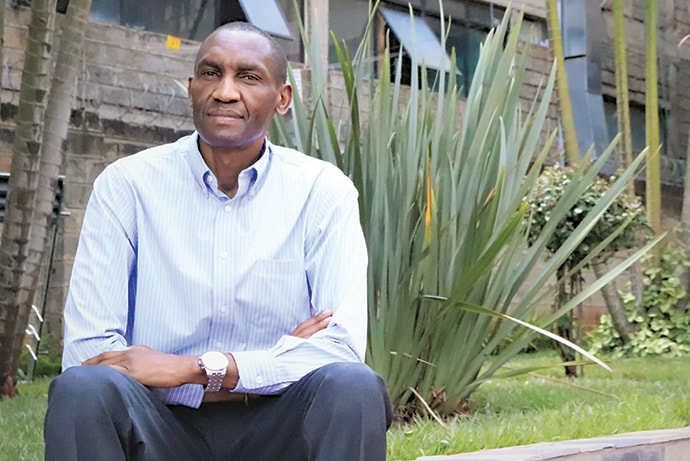
Chege Ngugi has been the Africa Regional Director for ChildFund International since 2020, following nearly a decade serving as ChildFund’s country director for three of the organization’s program countries, including his native Kenya.
Chege grew up in rural Kenya, in a settlement area that had a mix of different tribes and ethnic groups with a variety of languages and levels of education. This environment taught Chege to work with a wide range of people from different cultures and backgrounds. He was close to his primary and secondary teachers. He said, “I attribute who I am to my teachers.”
Some of the people Chege grew up with lived on big farms with hundreds of acres. But others were experiencing extreme poverty. He saw what support means to those who don’t have much, and this shaped his life. Chege has spent his entire career working for nongovernmental organizations (NGOs) to help underprivileged people—those “at the bottom of the pyramid.” And the most vulnerable of those are children.
ChildFund International is a nonprofit organization working in 24 countries toward a world where every child is free to live at their fullest potential, no matter where they’re from or what challenges they face. They help children living in poverty to have the capacity to improve their lives and the opportunity to bring lasting change to their communities. ChildFund promotes societies that value, protect and advance the well-being and rights of children. They also enrich supporters’ lives through their support of ChildFund’s cause.
A holistic approach to hunger
A key issue to help children living in poverty is nutrition. “Nutrition is critical and is a challenging topic because of cultures and traditions,” said Chege. His team takes a holistic approach to ending hunger (Sustainable Development Goal #2) by addressing food security and food systems. For the former, they look at people’s livelihoods and help enhance their resilience. ChildFund helps people improve food production and productivity at the household level by making sure they have high-yielding seeds (and drought-resistant seeds in some areas), knowledge, technology, access to agricultural extension services, etc. They also make sure families know how to process and cook the food they have. They focus on nutrition for young children and the elderly, who especially need nutritious food.
In Kenya, 2.5 million people are facing food insecurity. Some have surplus food, but it’s spoiling. Farmers may lose more than 30 percent of their crops post-harvest, often due to poor storage and handling at the household level.
ChildFund addresses this by looking at four components of farming: production, processing, distribution, and consumption. They help farmers build structures so that they don’t lose food after harvest. For example, ChildFund helps farmers with the market production of moringa, a medicinal herb. You can use moringa’s leaves, oil, and bark—nothing is lost. Chege’s team helps farmers improve their enterprise skills, understand financial services, develop alternative sources of livelihood, and adapt to climate change. The people ChildFund works with, said Chege, are “the most vulnerable communities who are most impacted in hunger and climate.”
Chege is motivated by seeing results. If the results are positive, he builds on that and does more. If they are negative, then that is an opportunity to figure out how to do better—an incentive to do more. His team takes a MAGIC approach, a mindset of meaning, autonomy, growth, impact, and connection. “Human beings are social animals,” he said. “Working virtually is hard, but I enjoy seeing my team embracing new ideas and building on them.”
Working in different countries and cultures
Chege started his over-20-year career in international development in Kenya, with CARE International. His work with CARE took him to various countries where he first learned about the similarities and differences in cultural practices and anti-poverty work in different places. He moved on to work in Mozambique, Namibia and Uganda with international NGOs such as CARE and Food for the Hungry. Then he started with ChildFund, first as the country director for Mozambique, then Ethiopia, followed by Kenya, which remains his base as ChildFund’s Africa regional director.
“It was a privilege to work in different countries, in different positions with bigger responsibilities. I now sit in global strategic task forces and am able to contribute and learn more,” Chege said. “Countries have different ways of looking at poverty and traditions. We want to see children being responsible and growing up to contribute to the well-being of their societies and countries. Poverty remains the same, but the ways of addressing it are different.” Some countries have a cultural practice of child marriage while others do not. Chege’s team works to turn around harmful traditional practices like female genital mutilation (FGM). They work with practitioners to help them change and transition into work educating girls instead of performing FGM and supporting opportunities for alternative sources of livelihood.
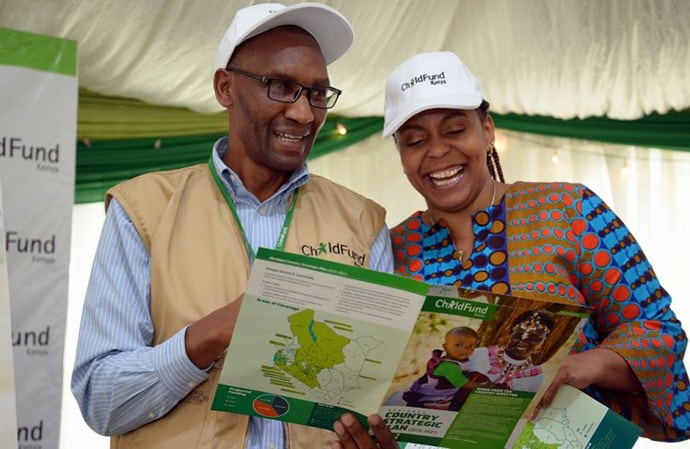
A life-stage approach to helping children
ChildFund takes a life stage approach. Chege’s team ensures that the youngest children, ages 0-5, are provided for and have good nutrition, health and quality support for their early development. For the 6- to 14-year-old age group, the focus is on education and health. ChildFund addresses learning capacity, prevention of violence in school, and governance at the school level. For young adults ages 15-24, the focus is on skills to earn a living, their inclusion in decision-making in their community, and sexual and reproductive health.
“Another area we’re going into is advocacy,” Chege said. “There are so many policies that affect children and women, for example. We are working with different stakeholders and governments to make sure policies are there to protect girls.”
One ChildFund program called Responsive and Protective Parenting aims to improve protection and developmental outcomes for infants and young children through working with parents and caregivers, government and community stakeholders to strengthen their capacities to support children’s development.
COVID-19 brings challenges and silver linings
Of course, the COVID-19 pandemic has been very hard on the vulnerable communities ChildFund works with. Because of lockdowns, businesses and schools closed, many people lost employment and children were at home. This obviously affected how everyone interacted, including ChildFund. The pandemic impacted program delivery and increased the cost of programs. “Some donors diverted money to health systems and infrastructure. That affected other services,” said Chege.
There have been some silver linings in Chege’s work during the pandemic. Not being able to travel saved the team money. Many people became more digitally savvy, learning how to use Zoom for meetings and online platforms for education. Hardship inspired innovation, like psycho-social first aid programs and solar-powered radios (details below). People can rise to meet challenges.
“There’s a silver lining in everything. People have become better managers. A challenged employee is a good employee. In some ways, the pandemic improved teamwork and team spirit,” said Chege.
During the pandemic, ChildFund prioritized four areas of their work:
- Stop COVID-19 from infecting children and families: They set up hand-washing stations, educated communities about how to prevent COVID-19, trained frontline workers, and provided materials for kids at home.
- Ensure that children get nutritious food: ChildFund provided cash transfers to families so they could buy and have food on the table, provide medicine, and pay for rent. “That was very helpful. Electronic Vouchers that households can use for water, washing and other things give them independence and dignity. It’s empowering,” said Chege.
- Keep children safe physically and emotionally: With people at home, there has been an increase in sexual and gender-based violence. ChildFund helped community-based child protection systems find and respond to cases of neglect and exploitation. One innovative program was online psychosocial first aid, which refers people to services like counseling sessions, links peer groups so they can talk with each other about similar challenges they’re experiencing, etc.
- Help children continue learning while schools were closed: Most governments provided platforms for online learning, but children from the poorest families were not able to join (only 20 percent of children in Kenya were able to join). “We had to improvise,” said Chege. “We provided solar-powered radios for people who couldn’t afford a radio, and, in some areas, they didn’t have electricity. Those same radios have solar lighting so children can do homework and the families can also use them.”
In urban areas, ChildFund provided smartphones for families that couldn’t afford electricity so that their children could get online and study. They also supported community charging stations and solar charging stations. Some areas provide solar panels to charge phones and study. ChildFund also distributed a lot of home-learning materials.
Still, even now that schools are mostly open, some children had to work to support their families during the pandemic and now it’s difficult to get them back into school. Chege is also concerned about online sexual exploitation now that so many children are online to study. This is something ChildFund is working on as well.
“As we focus on post-COVID-19 socio-economic recovery efforts, there are a number of critical priorities that we will address in order to support vulnerable families, especially children, across Africa. These include rebuilding livelihoods, boosting child protection efforts, strengthening health, nutrition and education systems, water, hygiene and sanitation,” said Chege. “I look forward to working with more stakeholders and partners so that we can support more families and possibly expand our operations across the continent.”
And beyond. “ChildFund’s new 2030 global strategic plan has an ambitious goal of reaching about 100 million children and family members annually to ensure that children grow up healthy, educated, skilled and safe,” Chege said. “The strategy emphasizes growing connections, which includes working with different kinds of partners to reach the goal—with corporates including tech companies and others.” He cited the example of Google, with which ChildFund has launched an exciting new project in Kenya designed to protect children and youth against the rampant threat online sexual exploitation and abuse.
“Innovative partnerships like this,” added Chege, “have incredible power to help children far beyond our existing program reach.”
Back to Top
Welcome New Members
Please welcome our newest Global Washington members. Take a moment to familiarize yourself with their work and consider opportunities for support and collaboration!
RainmakersTV
RainmakersTV is a documentary series established to communicate stories of leadership, innovation and social responsibility that inspire global transformation. rainmakers.tv
Sattva
Sattva is an organization driven by the mission to end global poverty in our lifetime. Since 2009, its work has spanned 27 countries across SE Asia, Africa and LATAM, with teams in India, Denmark and USA. Sattva works with corporations, impact investors, foundations, and social organizations to achieve social impact goals effectively and maximize social return on their investments. sattva.co.in
Back to Top
Member Events
October 25: PeaceTrees’ 26th Anniversary Virtual Celebration
November 3: Posner Center Symposium (Nov.3 – Nov. 19)
November 4: Water1st: GiveWater 2021 Virtual Benefit
November 4: Seattle’s In Person Event benefitting buildOn
December 9-10: Global Health Landscape Symposium
Back to Top
Career Center
Event Coordinator // Global Washington
Vice President – Credit (Senior Credit Officer), Social Investment Team // Global Partnerships
Data Manager // Schools for Salone
Associate, Communications // VillageReach
Agriculture Program Manager US & Canada – Seattle, USA (TBC) // Earthworm
Technology & Data Manager, Global // Splash
Consultant – International Business (Remote) // Sattva Consulting
Check out the GlobalWA Job Board for the latest openings.
Back to Top
GlobalWA Events
Dec 8 & 9: 2021 Goalmakers Conference
Back to Top
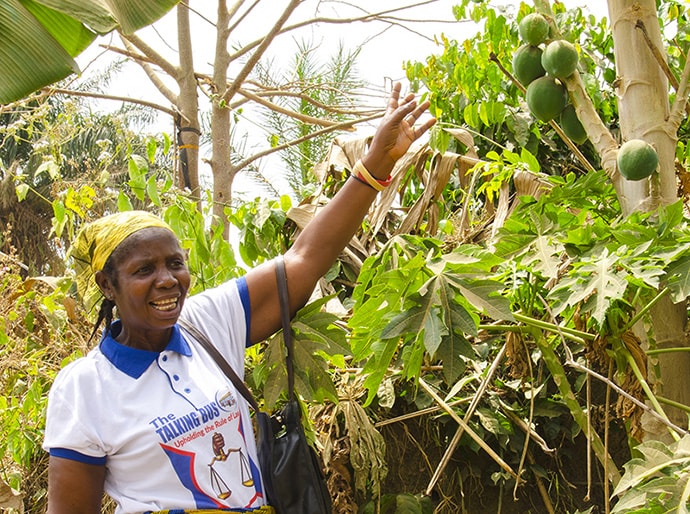
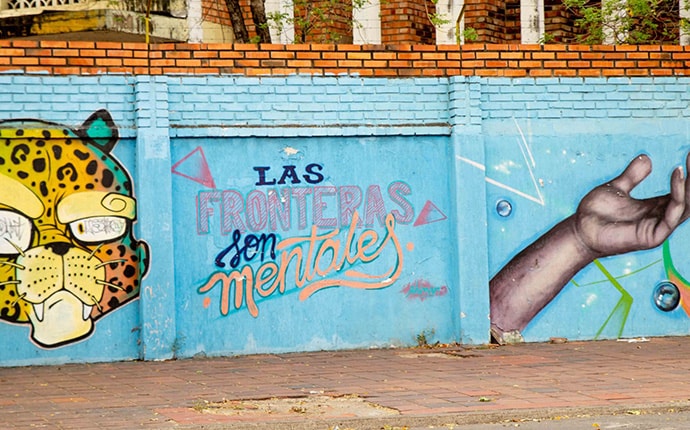
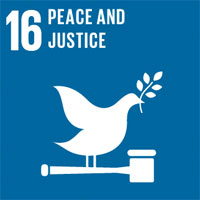 The United Nation’s Sustainable Development Goal 16 focuses on “Peace, Justice and Strong Institutions”, but what are “Strong Institutions”?
The United Nation’s Sustainable Development Goal 16 focuses on “Peace, Justice and Strong Institutions”, but what are “Strong Institutions”?